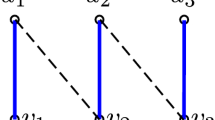Abstract
Given an undirected graph \(G=(V,E)\), the k-path partition problem is to find a collection of vertex-disjoint paths containing at most k vertices to cover all the vertices of V. The objective is to minimize the number of paths in the collection. For the k-path partition problem with \(k\ge 3\), we propose a simple local search algorithm, whose approximation ratio improves on the best-known approximation algorithm in Chen (in: Chen, Li, Zhang (eds) Frontiers of algorithmics, Springer, Cham, 2022) for every \(k\ge 4\), especially for \(k=4,5,6,7\). In addition, we give examples to show that our algorithm is tight when k is odd. When k is even, we give almost tight examples.



Similar content being viewed by others
Notes
Because any path containing more than three vertices can always be broken into 2-paths and 3-paths by removing properly some edges.
To do this efficiently, we assign a label q to each vertex v if v is an endpoint of some q-path of the current solution. If v is not an endpoint of any path of the current solution, its label is defined as 0. Note that for each execution of Operation 1 we need only update the labels of at most six vertices, i.e. the four endpoints of the two paths being merged and (possilby) another two endpoints of the resulting two new paths.
We assume that w.l.o.g. the edge \(\{u,v\}\) connects a q-path and a \(q'\)-path with \(q,q'\in \{2,3,\ldots ,k-2\}\). If one of \(q,q'\) equals 2, Case 1 of Operation 1 happens since \(q+q'\le 2+(k-2)=k\). Otherwise, one can verify that one of the three cases of Operation 1 occurs.
This inequality holds trivially if \(i\bmod 3 \le k\bmod 3\). Otherwise, it holds that either
\(i\bmod 3=1> k\bmod 3=0\) or \(i\bmod 3=2> k\bmod 3\in \{0,1\}\), which implies \(\left\lfloor \frac{i}{3} \right\rfloor \le \left\lfloor \frac{k}{3} \right\rfloor -1\). Thus,
$$\begin{aligned} 2\cdot \left\lfloor \frac{i}{3} \right\rfloor + i\bmod 3 \le 2\cdot (\left\lfloor \frac{k}{3} \right\rfloor -1) + i \bmod 3 \le 2\cdot \left\lfloor \frac{k}{3} \right\rfloor . \end{aligned}$$
References
Chen, Y., Goebel, R., Lin, G., Su, B., Xu, Y., Zhang, A.: An improved approximation algorithm for the minimum 3-path partition problem. J. Comb. Optim. 38(1), 150–164 (2019)
Chen, Y., Goebel, R., Su, B., Tong, W., Xu, Y., Zhang, A.: A 21/16-approximation for the minimum 3-path partition problem. In: Proceedings of the 30th International Symposium on Algorithms and Computation (ISAAC 2019), vol. 149(46), pp. 1–20 (2019)
Chen, Y., Goebel, R., Lin, G., Liu, L., Su, B., Tong, W., Xu, Y., Zhang, A.: A local search 4/3-approximation algorithm for the minimum 3-path partition problem. In: Chen, Y., Deng, X., Lu, M. (eds.) Frontiers in Algorithmics. FAW 2019 Lecture Notes in Computer Science, vol. 11458, Springer, Cham, pp. 14–25 (2019)
Chen, Y., Chen, Z., Kennedy, C., Lin, G., Xu, Y., Zhang, A.: Approximation algorithms for the directed path partition problems. In: Chen, J., Li, M., Zhang, G. (eds.) Frontiers of Algorithmics. IJTCS-FAW 2021. Lecture Notes in Computer Science, vol. 12874, Springer, Cham (2022). https://doi.org/10.1007/978-3-030-97099-4_2
Duh, R., Furer, M.: Approximation of \(k\)-set cover by semi-local optimization. In: Proceedings of the Twenty-Ninth Annual ACM Symposium on Theory of Computing, STOC’97, pp. 256–264 (1997)
Garey, M.R., Johnson, D.S.: Computers and Intractability: A Guide to the Theory of NP-Completeness. Freeman, San Francisco (1979)
Goldberg, A.V., Karzanov, A.V.: Maximum skew-symmetric flows and matchings. Math. Program. 100(3), 537–568 (2004)
Kirkpatrick, D., Hell, P.: On the completeness of a generalized matching problem. In: Proceedings of the Tenth Annual ACM Symposium on Theory of Computing, pp. 240–245 (1978)
Korpelainen, N.: A boundary class for the k-path partition problem. Electron. Notes Discrete Math. 67, 49–56 (2018)
Levin, A.: Approximating the unweighted \(k\)-set cover problem: greedy meets local search. SIAM J. Discrete Math. 23(1), 251–264 (2009)
Monnot, J., Toulouse, S.: The path partition problem and related problems. Oper. Res. Lett. 35(5), 677–684 (2007)
Palsetia, D., Mostofa Md., Patwary A., Hendrix W., Agrawal A., Choudhary, A.: Clique guided community detection. In: Proceedings of 2014 IEEE International Conference on Big Data, pp. 500–509 (2014)
Steiner, G.: On the k-path partition problem in cographs. Congr. Numer. 147, 89–96 (2000)
Steiner, G.: On the k-path partition of graphs. Theor. Comput. Sci. 290(3), 2147–2155 (2003)
Yan, J., Chang, G., Hedetiemi, S., Hedetniemi, S.: \(k\)-Path partitions in trees. Discrete Appl. Math. 78(1), 227–233 (1997)
Acknowledgements
The authors are grateful to the anonymous referees for their valuable and constructive comments. This research is supported by the National Natural Science Foundation of China under Grant Numbers 11671135, 11871213 and the Natural Science Foundation of Shanghai under Grant Number 19ZR1411800.
Author information
Authors and Affiliations
Corresponding author
Additional information
Publisher's Note
Springer Nature remains neutral with regard to jurisdictional claims in published maps and institutional affiliations.
Rights and permissions
Springer Nature or its licensor (e.g. a society or other partner) holds exclusive rights to this article under a publishing agreement with the author(s) or other rightsholder(s); author self-archiving of the accepted manuscript version of this article is solely governed by the terms of such publishing agreement and applicable law.
About this article
Cite this article
Li, S., Yu, W. & Liu, Z. A local search algorithm for the k-path partition problem. Optim Lett 18, 279–290 (2024). https://doi.org/10.1007/s11590-023-01989-8
Received:
Accepted:
Published:
Issue Date:
DOI: https://doi.org/10.1007/s11590-023-01989-8




